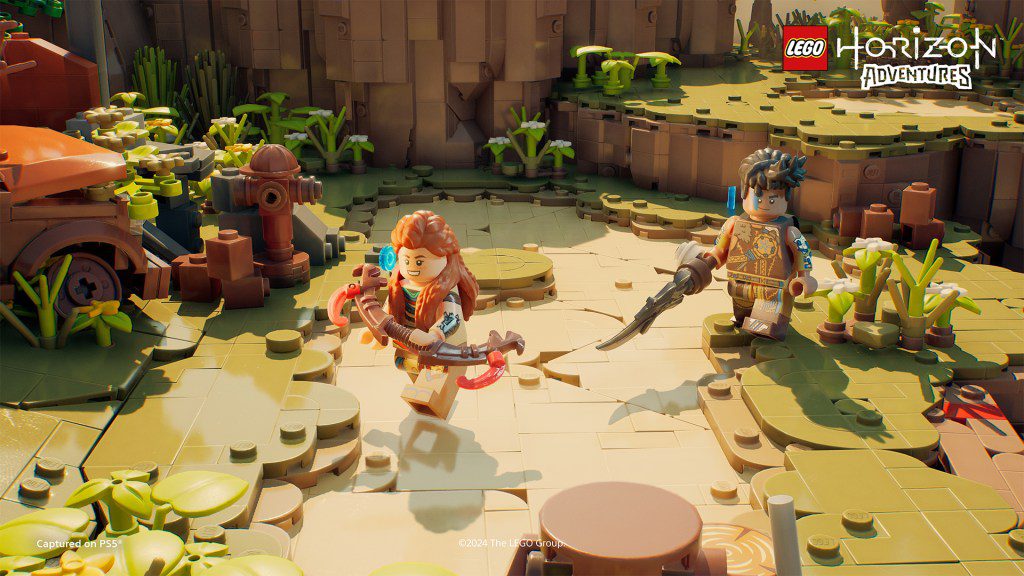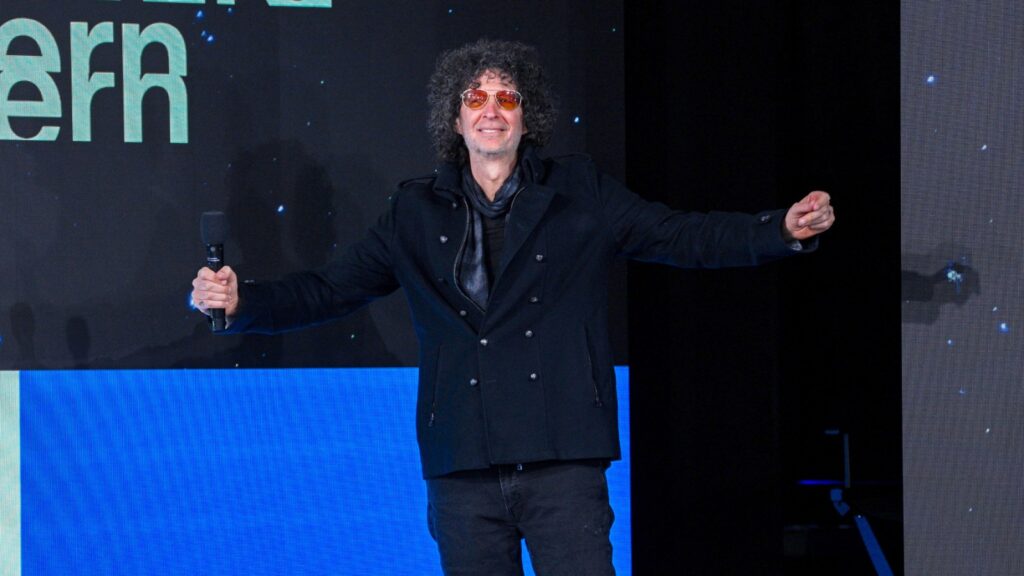PlayStation Is Entering Its Kiddie Era — And It Rocks
If you ask anyone of a certain age, they’re likely to recall a time when video games were considered something just for kids. Of course, in the early days, they were. Nintendo built an empire on making characters as recognizable as Mickey Mouse across a dozen different franchises. And despite the breakthrough of more mature (read: violent) franchises in the years that followed, the golden age of gaming was dominated by family friendly iconography in the larger cultural sphere.
And while Nintendo may have dominated that space, they weren’t the only ones. From its earliest days, PlayStation has been a brand predicated on walking the fine line between having a cavalcade of mascots that fit right alongside their more gritty, cinematic fare. Look back at some of the best kid’s games of all time — Crash Bandicoot, Sly Cooper, Jak & Daxter — they all were synonymous with the PS brand.
It’s a different era now, and the likes of PlayStation and Xbox have mostly pressed forward with adult-oriented entertainment. There are exceptions, like the Ratchet and Clank and Marvel’s Spider-Man series, which have become two of PlayStation’s best-selling franchises. But for the most part, it feels like support for all-ages efforts has dwindled from anyone not named Nintendo. It’s also worth noting that both of those titles come from the same developer, Sony-owned Insomniac Games.
But trends are cyclical, and after some recent announcements from Sony through their State of Play showcase and inclusion in Summer Game Fest, it looks like the days of PlayStation’s brooding mature focus may come to an end — or at least, become more balanced.
This year, Sony seems to have a new focus, one where the AAA resources and artistry of their biggest adult blockbusters are being put into the kinds of efforts that first put PlayStation on the map for a generation of players. That begins with two new first-party titles: Guerrilla Games’ LEGO Horizon Adventures and Team Asobi’s Astro Bot.
At this year’s Summer Game Fest in Los Angeles, Rolling Stone had a chance to play both titles and speak with the developers who are looking to bring adolescent joy back to the forefront.
The first demo we played was LEGO Horizon Adventures, which was officially announced during the Summer Game Fest’s live stream kickoff. Of the two, it’s a more surprising direction for Sony to take for a push into all-ages, merging the dramatic storytelling world of the sci-fi focused Horizon series with the goofy self-referential tone of other LEGO-licensed crossovers. Anyone who’s played LEGO Star Wars: The Skywalker Saga or LEGO Marvel Super Heroes knows that they’re often presented as comedic sendups of the stories, tropes, and lore of the original franchises.
That’s exactly where the development team at Guerilla Games wanted to begin.
Speaking with lead producer Tim Symons, who worked at Nintendo before jumping over to Guerilla Games to work on the Horizon series, it’s clear that the ability to take creative liberties with a satirical take on the franchise’s story was one of the main selling points.
‘LEGO Horizon Adventures’ features two-player co-op with multiple characters from the franchise.
Sony Interactive Entertainment; Guerilla Games
During a hands-on playthrough of some early sections, Symons sits back as cinematics and dialogue play out. Adventures is ostensibly a loose retelling of the events of the first entry in the series, Horizon Zero Dawn, which depicts a post-apocalyptic world overrun by robotic wildlife where tribes of humans are in a state of perpetual conflict until Aloy (voiced by Ashly Burch), arises as a new messiah. Here, Aloy is once again voiced by Burch, zipping through the narrative setup while poking fun at the basic premise and rules of this world.
Adventures plays much like other LEGO titles, with an isometric view of the world where players can control the series’ characters either solo or in two-player co-op, beating up baddies and exploring for hidden treasure. Many of Horizon’s main mechanics come into play, like Aloy’s earpiece, which augments her view of the world to reveal enemies’ weak points. It’s obviously a heavily simplified experience, but during our time with the demo, there were clear difficulty spikes — especially with boss encounters — that indicate that there’s some challenges in store.
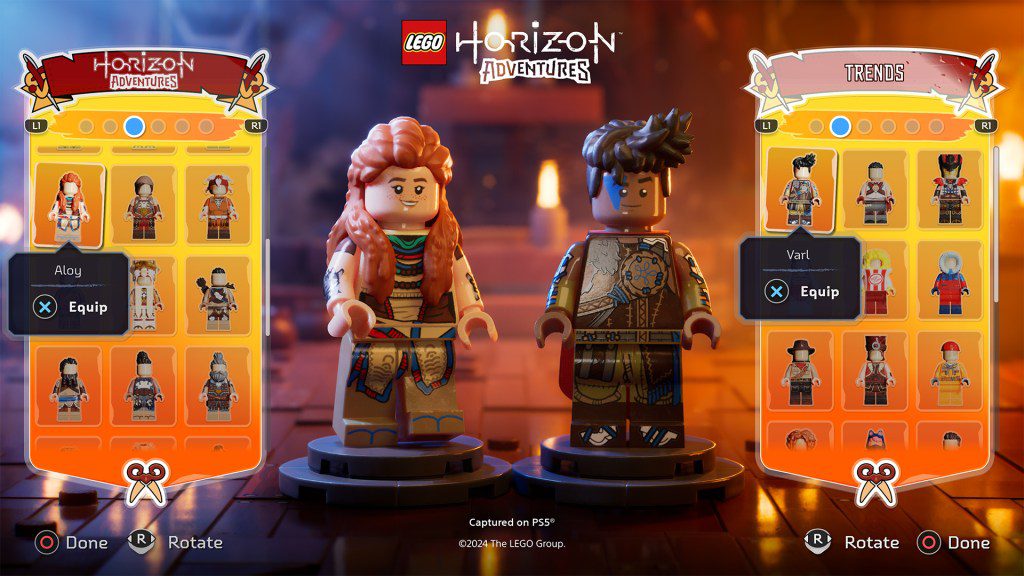
Mini-figs are designed to be realistic down to the scuffs and weathering of real toys.
Sony Interactive Entertainment; Guerilla Games
And while Adventures does right by Horizon’s look, it also sets itself apart from other LEGO titles in its visual design. As we explore the first level, Symons highlights some of the aesthetic choices that the team wanted to emphasize. Each mini-fig is modeled to look exactly like a perfectly 3D scanned version of a real-life toy, including different textures between the plastic limbs and fabric of the cloth and stickers used for clothes, many of which appear weathered from frequent play. The environments glean in dramatic sunlight toward dusk, from which the reflections expose fingerprints on the floors and walls that make it seem like the world has actually been assembled and played with by hand.
In fact, every piece of the world is painfully recreated from individual LEGO pieces that are actually available to audiences in real life, down to fire consisting of rows of flame figs and tree branches lined with snappable leaves.
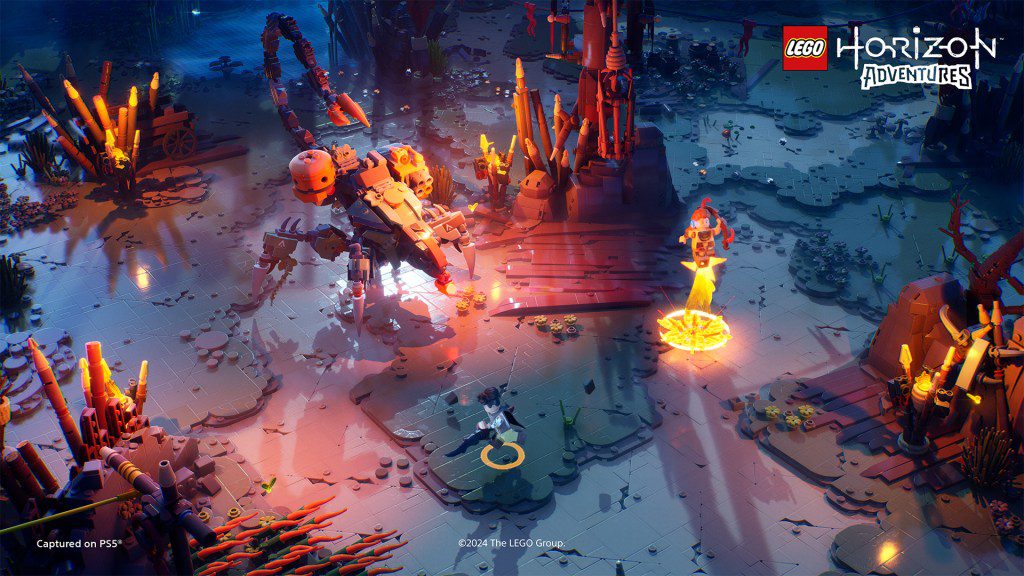
Boss battles can be challenging, especially in singleplayer mode.
Sony Interactive Entertainment; Guerilla Games
“Rule number one,” Symons says, “is never bend the plastic.” Unlike many animated or virtual adaptations set in the LEGO universe, characters in Adventures never break the rules of their own LEGO-ness. That means, limbs and movement are clearly limited to actions that could only be done with a real mini-fig, with characters behaving in frantic jittery motions like they’re being pushed along by a child. Visually, it much more closely resembles The LEGO Movie series than any other game, which itself was an aesthetic explosion of the LEGO world that adhered very closely to the physics of playing with LEGO in the real world.
And if LEGO Horizon Adventures is a case of sticking to reality to enrich fantasy, then the second title we played is an example of full-blown fantasy elevating the tactile world.
Astro Bot, developed by Team Asobi, is the first full-scale adventure developed exclusively around PlayStation’s house mascot. Previously seen in Astro’s Playroom, a short game that comes with every PlayStation 5 unit, Astro, as a character, doesn’t really have a bespoke identity or even a backstory. It’s just an adorable chibi-bot that serves as a blank slate for the moment-to-moment play.
In Astro’s Playroom, that meant being an avatar to guide players through the various cutting-edge functionalities of the PS5 system. Yet despite being a glorified demo, Astro’s Playroom struck a chord with fans. Graphically astonishing, tight to control, and filled with inventive uses of the DualSense controller, it felt every bit like the mascot platformer PlayStation has needed in recent years. That’s what Astro Bot aims to achieve as the little automaton’s coming out party.
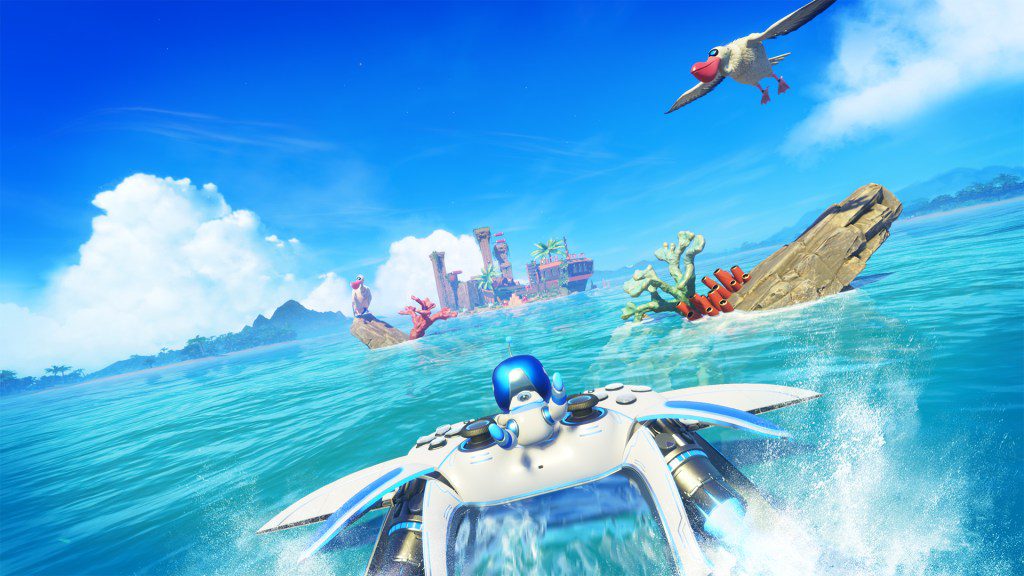
Astro Bot cruises the waves on a literal PlayStation 5 controller.
Sony Interactive Entertainment; Team Asobi
Team Asobi’s studio head and creative director of Astro Bot, Nicolas Doucet, tells Rolling Stone that the developers’ overarching vision is “elegant simplicity.” This applies to the basic level design, which sees small worlds of various platforms and arenas all packed to the brim with minute detail. As Astro, players can walk up and punch just about anything to get a response. Glass shatters when hit, water can be scooped out of pools and puddles, and just about everything in Astro’s world can be interacted with, often accompanied by visceral feedback from the rumbles and tugs of the DualSense controller.
“[It’s] the philosophy of turning the game into a toy,” says Doucet. “These toy aspects [are] valid for gamers because, fundamentally, everybody enjoys little pockets of playful reaction.”
You might wonder why a cartoon-like platformer needs the horsepower of a PlayStation 5 behind it. After all, Nintendo builds worlds packed with reactive charm with weaker tech than a mid-era iPhone. To Doucet, it’s all about physics, which plays heavily into how seamlessly interactive Astro Bot can be.
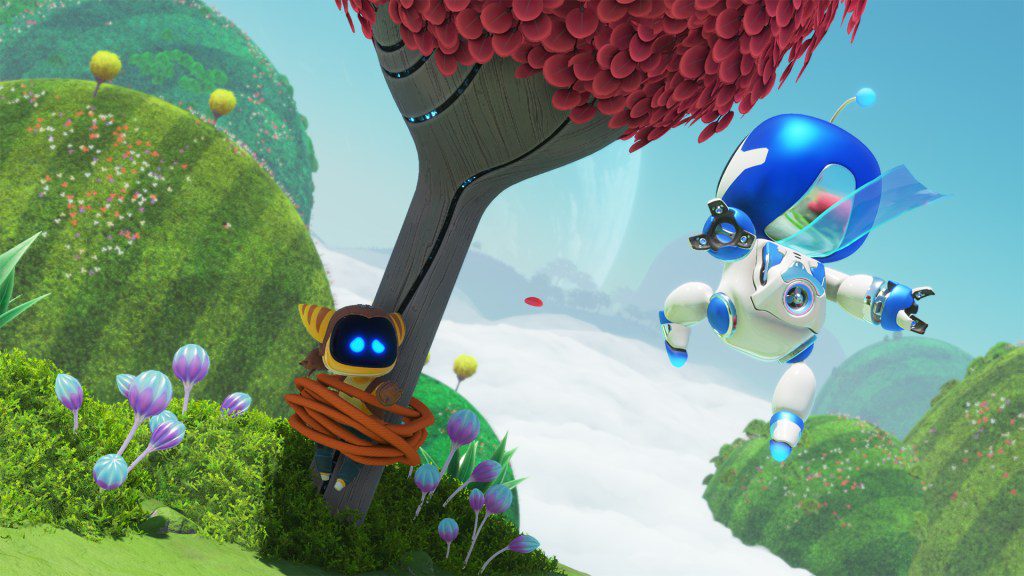
Crew members take the form of PlayStation icons like Ratchet.
Sony Interactive Entertainment; Team Asobi
Like LEGO Horizon Adventures, Astro Bot’s emphasis on the toylike texture of its world is key, but Team Asobi also flexed their comedic muscles with playful reimagining of many of PlayStation’s most famous characters. The broad premise is that Astro’s mothership (modeled after a PlayStation 5) falters, shooting its 300 or so crew members across various galaxies. The goal is for players to make their way through each level picking up the shipwrecked crew along the way. The hook is, many are styled after PlayStation characters from franchises like Ratchet and Clank or PaRappa the Rapper. Some worlds may even be totally designed around specific franchises’ motifs.
The balance between characters from younger skewing or newer franchises versus older or more mature ones serves a significant purpose. Astro Bot is designed to appeal to less skilled players and experts alike, and the paths created for all kinds of players differ accordingly. Doucet explains that the first galaxy and mainline path to progression should be accessible to less experienced players, allowing them to complete the story. In those levels, they’re likely to encounter characters pulled from more family-friendly series, whereas players who are able to tackle the vastly more difficult challenge levels will see characters that may appeal to more hardcore gamers (hello, Kratos).
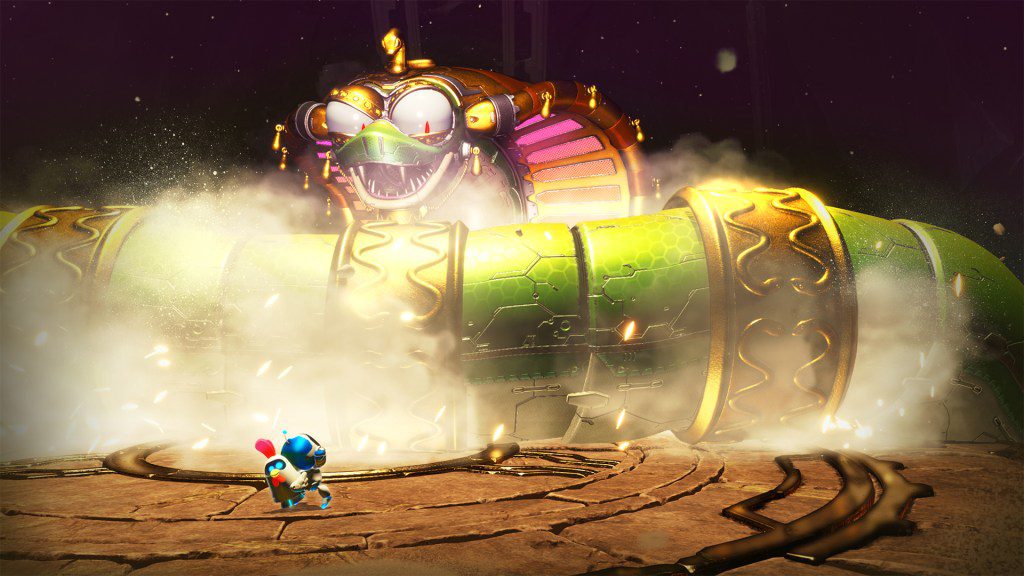
The game has the visuals of a juiced up Mario adventure.
Sony Interactive Entertainment; Team Asobi
The balance between a self-referential good time and the ability to draw in hardcore fans is a throughline shared between both LEGO Horizon Adventures and Astro Bot, harkening back to a bygone era where games were not just sillier, but really fucking hard regardless of who was playing. But both teams are clearly motivated to craft experiences that can draw in players of all kinds, while still adhering to the top-tier production values and satisfying gameplay that’s true to the best PlayStation first-party titles.
Come the fall, both LEGO Horizon Adventures and Astro Bot will launch to make their cases for PlayStation’s future as an all-ages contender in the big-budget mainstream space. Adventures, in particular, will break new ground as one of the first ever PlayStation originals to be released simultaneously not just on the PS5 and PC, but on Nintendo Switch. Based on the impressions from attendees at Summer Game Fest, there could even be legitimate shots at end of year award nominations. But for now, the wait for the next great mascot game to play with the kids (or just your drunk buddies) begins.


